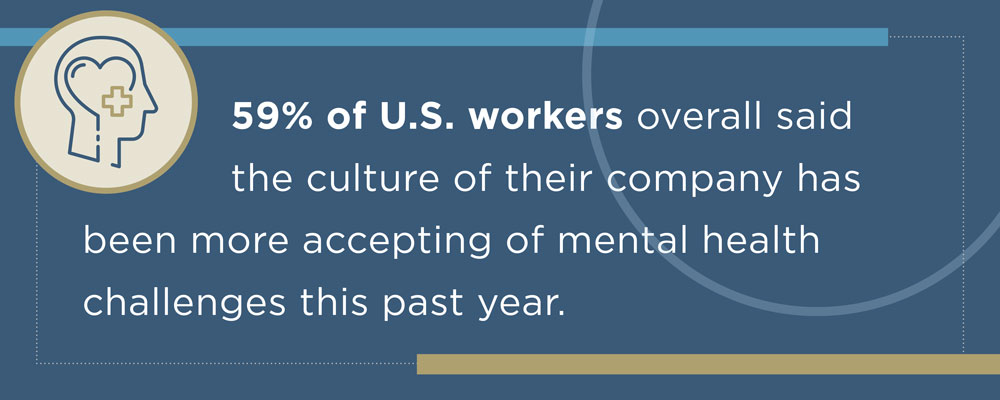Workplace Mental Health Study Findings a ‘Wake-Up Call’

A new study from The Hartford shows that 70% of U.S. employers now recognize mental health as a significant workplace issue.
The Hartford surveyed employers nationwide, with 72% saying the stigma associated with mental illness prevents many U.S. workers from seeking help.
“Our new data on stigma is a wake-up call,” The Hartford’s chair and CEO Christopher Swift said in a statement.
“As the U.S. economy is rebuilt, we urge business leaders to continue to prioritize employee mental health—fostering stigma-free company cultures, increasing access to research, and encouraging early treatment.”
Unfortunately, COVID-19 only made the problem worse, says CBIA HR counsel Diane Mokriski.
“Without a doubt, the pandemic has had a huge impact on the prevalence of mental health problems in the workplace,” Mokriski said.
“Employers are seeing a noticeable increase in mental health issues among their employees—issues like fear and anxiety about returning to the workplace, domestic violence, substance misuse, and depression resulting from the everyday life changes caused by COVID.”
Divide
The Hartford polled 617 employers and 1,005 employees between January and February.
The survey found that 52% of employers said they are experiencing significant or severe workplace issues due to substance misuse and addiction.
The survey is part of The Hartford’s 2021 Future of Benefits Study and shows a divide between employers and employees over mental health in the workplace.
For example:
- 80% of employers say their company has been more accepting of mental health challenges in the past year, but only 59% of workers agree
- 79% of employers say they have an open and inclusive environment that encourages conversations about mental health, compared to 52% of workers who agree
- 77% of employers say leadership at their company encourages conversations about mental health, but just 56% of workers agree
- 78% of employers said workers have flexibility in their schedule to get the mental health help they need, but only 56% of workers agree
“These divergent perceptions indicate the pervasiveness and power of stigma, as well as the continued need for education and communication about mental illness and addiction,” the study reports.
Employee Support
Swift noted that a majority of employers in the survey said they feel prepared to support their employees’ mental health.
“We applaud their efforts to support employees’ overall well-being during these times of intense change,” he said.
Businesses can address the disconnect between employer and employee perceptions by distributing a statement or policy that openly acknowledges the difficulties employees may be facing, Mokriski notes.
“Ignoring the problem will be short-sighted, as untreated mental illness and addiction can lead to exacerbated, long-term problems.”
CBIA’s Diane Mokriski
It should also describe the services the company offers, such as Employee Assistance Programs, disability insurance, and scheduling accommodations, she said.
“Ignoring the problem will be short-sighted, as untreated mental illness and addiction can lead to exacerbated, long-term problems that significantly impact work performance and attendance,” she said.
“It’s important for employers to remember that some mental illnesses and addictions may qualify as disabilities under the ADA.
“Employers should therefore familiarize themselves with the rules that require open communication—known as the ‘interactive process’ between employer and employee—and in some cases, reasonable accommodations for those who need it.”
Economic Impact
The Hartford’s research also showed the economic impact of untreated conditions due to stigma.
Nearly one-third of U.S. employers (31%) said the strain on employee mental health is having a significant or severe financial impact on their company—a 10-point increase from a March 2020 survey.
The Hartford’s claims data shows that untreated mental health and substance use disorders can lead to unplanned absences and prolonged disability.
The Hartford’s research shows that mental health issues are among the top five reasons for short-term disability claims.
The company’s disability claims data also shows that, excluding pregnancy, mental health issues are among the top five reasons U.S. workers file a short-term disability claim.
The company notes that a person diagnosed with a primary injury or illness, along with the presence of mental health conditions such as anxiety or depression, takes two to three times longer to recover than someone with similar physical injuries but no mental health conditions.
“The recent research from The Hartford is encouraging and shows U.S. employers are concerned for their employees’ mental health,” said Daniel Gillson Jr., CEO of the National Alliance on Mental Illness.
“We are acutely aware that the need for mental health services is increasing, and reducing stigma in the workplace is paramount to improving the lives of employees.”
For more information, contact CBIA’s Diane Mokriski (860.244,1900) | @HRHotline.
RELATED
EXPLORE BY CATEGORY
Stay Connected with CBIA News Digests
The latest news and information delivered directly to your inbox.



